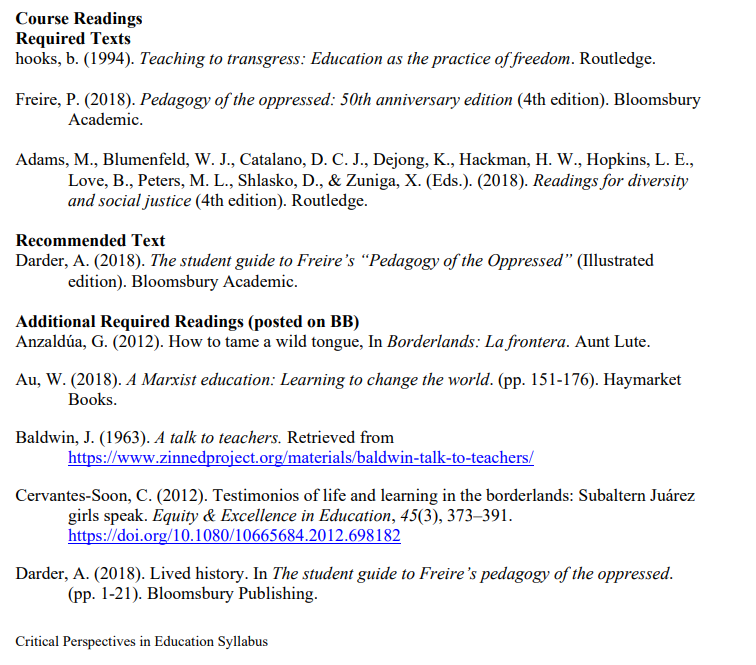George Mason University (CorruptED)
Incidents
George Mason University’s College of Education and Human Development courses include topics such as critical theory, critical pedagogy, critical race theory, Marxism, tenets of queer theory, white supremacy, and whiteness. Texts used in courses include Paulo Freire’s Pedagogy of the Oppressed, bell hooks’ Teaching to transgress: Education as the practice of freedom, and Delgado and Stefancic’s Critical race theory: An introduction.
COURSES
EDUC 855: Critical Perspectives in Education
The course EDUC 855: Critical Perspectives in Education course includes students learning about and applying critical race theory and other critical theories, and oppression. Course readings include Paulo Freire’s Pedagogy of the Oppressed and a piece on Marxism.
The course overview states that it will explore “critical perspectives in education as an avenue to developing understandings of how issues of power, culture, and consciousness shape education, education systems, and educational research.”

Course learning outcomes state that students will “examine the perspectives of critical theorists in education, including (but not limited to) study of Critical Race Theory, LatCrit, DisCrit, Queer Theory, and Feminists scholars” and “develop their own critical praxis and pedagogy through dialogue and reflection.”

Topics for the course include the “critical foundations,” Paulo Freire’s ideas expressed through Pedagogy of the Oppressed, “critical race theory,” and the “intersections of Critical Race Theory and Critical Pedagogy.”

Required texts for the course include Paulo Freire’s Pedagogy of the Oppressed: 50th Anniversary Edition, A Marxist education: Learning to change the world, bell hooks’ Teaching to transgress: Education as the practice of freedom, and Delgado and Stefancic’s Critical race theory: An introduction.


EDUC 856: Critical Praxis in Education
The course titled EDUC 856: Critical Praxis in Education focuses on activism and includes topics such as the “three pillars of white supremacy,” “Family privilege,” “intersectionality,” and “gender affirming policies.”
The course overview states that it “critically studies education and education-linked policies and practices that differentially affect individuals, families, and groups” and “drawing upon critical perspectives in education, students will examine the ways in which social inequalities are structurally reproduced through policies, laws, rules, and regulations in education and interlinked systems (e.g., social welfare, health care, criminal justice).”
Students will also study “social movements for justice, identify different forms of engagement, including education, research, advocacy, and activism, and plan action steps to catalyze systems of change in education.”

Students are required to complete “Reflexive Memos” for the course which are intended for students to “develop a critical reflexive practice, considering their own positionality and experiences, course readings and discussions, and notions of allyship and accompliceship while working towards systems of change.”

Another course assignment titled “Strategic Action Plan and Action Taking” states that students will “develop a strategic action plan to carry out a social action related to their policy research and analysis,” and that the “strategic action plan should include goals, organizational considerations, an analysis of constituents, allies and opponents, targets, and possible tactics.”


EDCI 597 and SEED 406: LGBTQ Issues in Education
The university course EDCI 597 and SEED 406: LGBTQ Issues in Education involves the study of queer theory and how to apply it to the classroom. The course also examines the role that white supremacy and whiteness play in a queer classroom.
The course overview states that it “provides instruction in how to create supportive, safe and affirming educational environments for LGBTQ+ students, faculty, staff and communities in classrooms, schools, as well as both formal and informal spaces of learning (i.e., Gay Straight Alliances and youth groups).” The course uses different activities “as a means to apply theories, methods, and practices from LGBTQ studies, queer studies, multicultural and educational studies to educational settings and contexts.”

Learning objectives include students investigating “appropriate educational experiences that use anti-oppressive pedagogies to challenge bigotry, inequality, and systems of oppression based upon gender expression, gender identity and sexual orientation” and “Identify and evaluate opportunities and practices across school curricula that enhance and support deeper engagement and understanding of LGBTQ+ histories, cultures, identities and issues.”

Course topics include “Queer Theory,” “Intersectionality,” transgenderism, and “Queering Curriculum.” Course content also includes queerness, white supremacy, and whiteness.

Stay Informed

